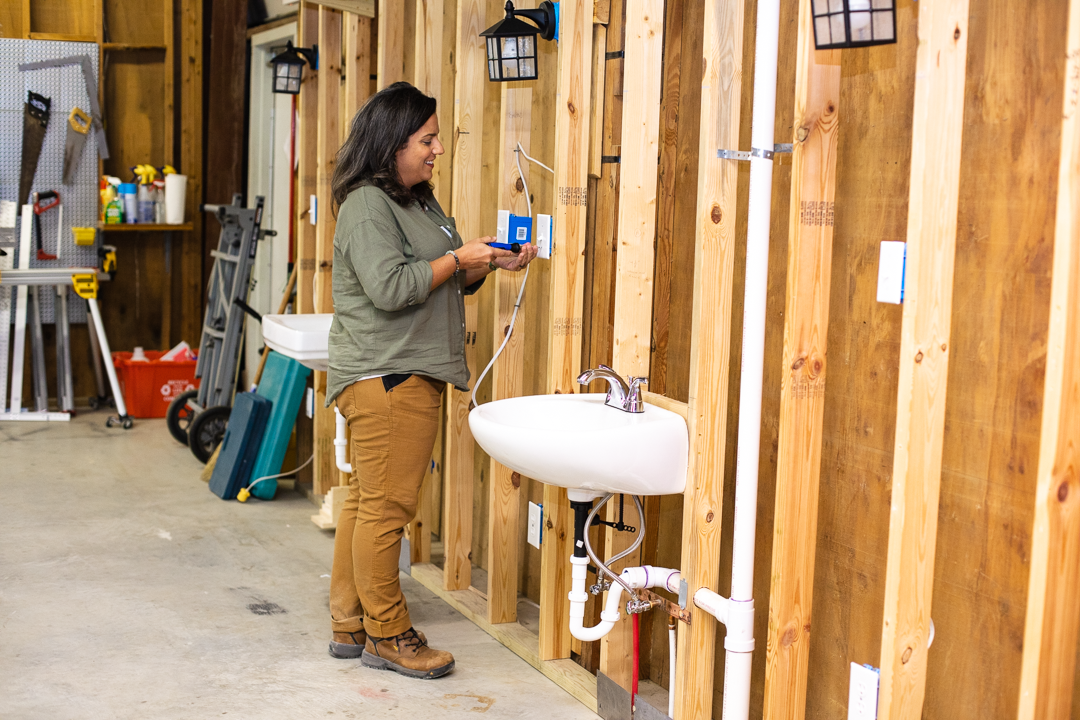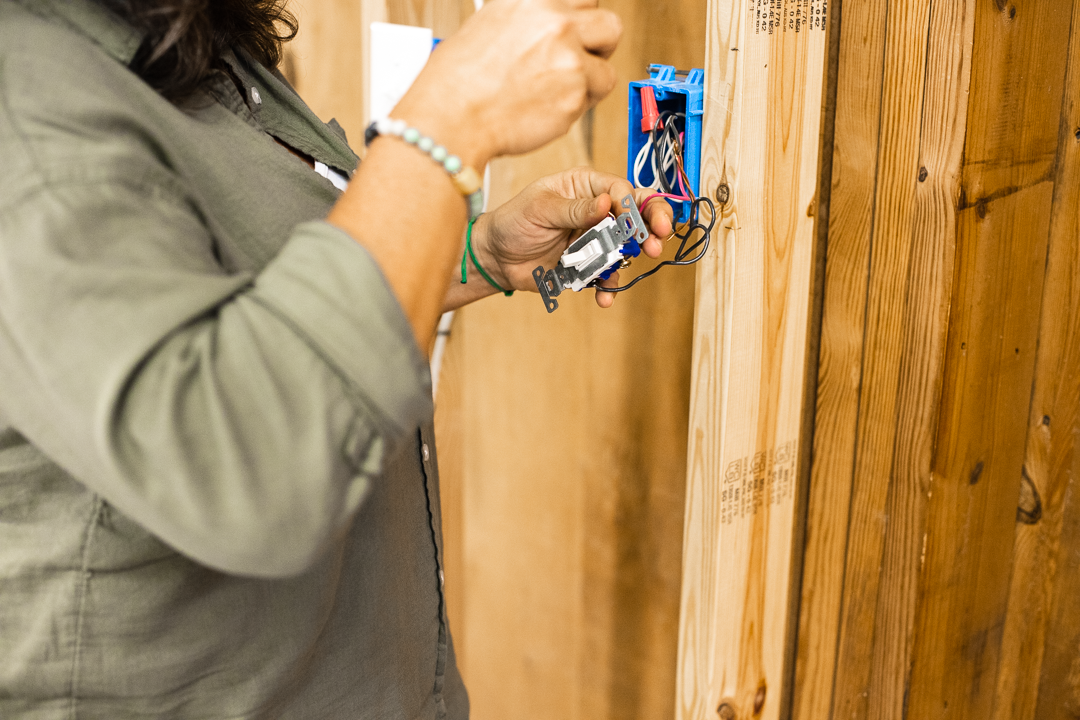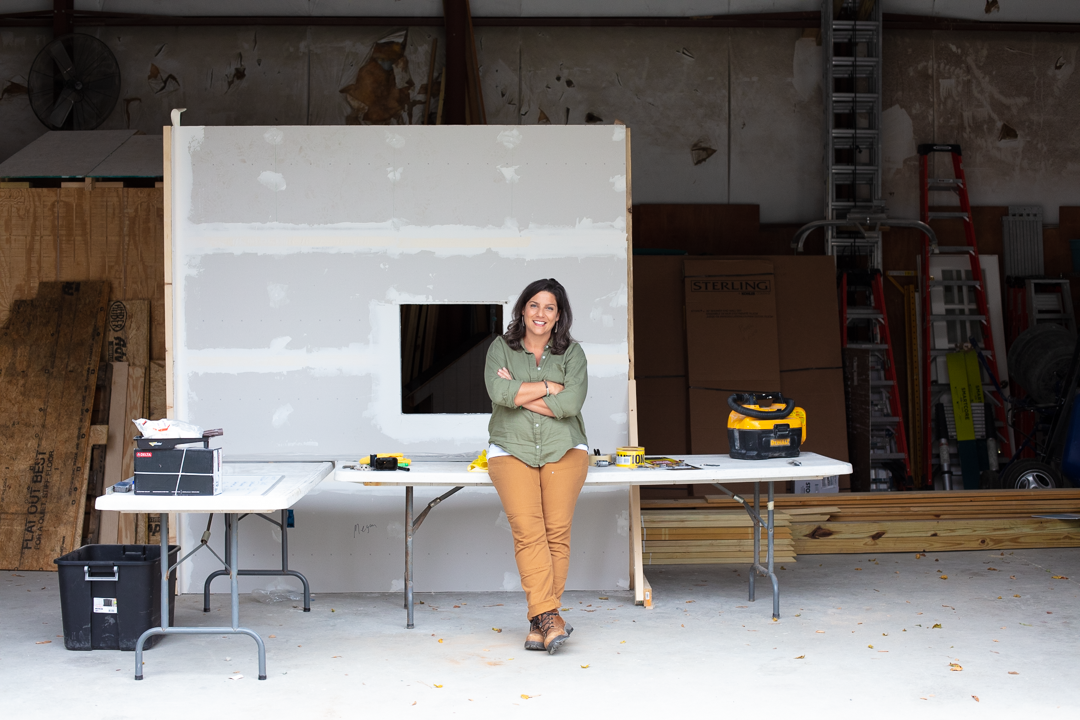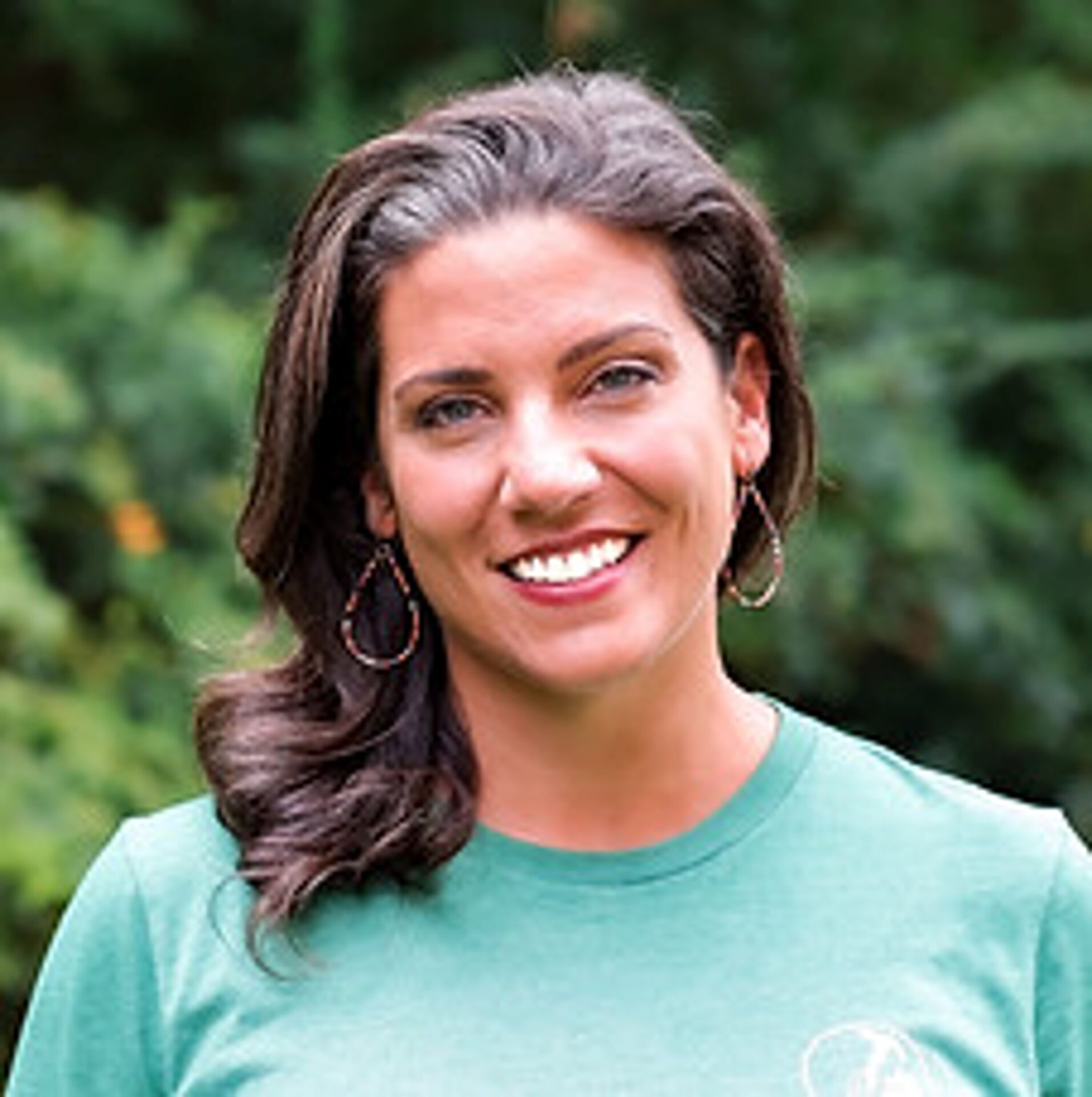Nora Spencer, the founder and CEO of Hope Renovations, remembers when one particular woman signed up as a trainee at her nonprofit. At that point, the trainee had as much to lose as gain. She was also a resident at UNC Horizons, a substance use disorder treatment program for women. Based on her court order, failure to complete the program could have cost her custody of her children. At first, the woman’s application to Hope Renovations—a nonprofit that prepares women for construction trade careers—was a way to fulfill the job training portion of the UNC Horizons Program. But, over time, learning to use a power saw and swing a hammer helped her build something unexpected: self-assurance.
“In the beginning, when this individual applied to our Hope Renovations program, she wasn’t particularly engaged or excited. She would hang back when we’d do projects,” recalls Spencer. “But by the end of the cohort, she was helping other people learn and was the first to volunteer and jump in when we did something new. She discovered she had a knack for trades work.”
After completing the Hope Renovations program, the trainee was hired by a local commercial builder and within nine months, she was promoted to a supervisory role. Today, the builder sends her to take community college classes that will prepare her to become a project manager. “She talks about how having access to this industry changed her life,” said Spencer. “In terms of confidence, she’s a different person now. That’s what we were able to help her build: confidence.
Women bolstering the construction workforce
The trainee’s positive experience is one of many made possible by Hope Renovations. Since 2020, the nonprofit has helped women develop new professional skills and personal resolve. It solves interconnected problems: women comprise only 4 percent of skilled trades workers in the construction industry, a sector that doesn’t have enough total workers to keep up with America’s building boom. All the while, the deficit of trades workers means that older adults can’t find workers to do smaller, yet critical home-repair projects. Hope Renovations’ solution is direct: train women with the skills to fill high-demand, high-wage construction jobs, while offering the construction industry a well-trained workforce and providing seniors with workers to repair and renovate their homes so they can continue living there.
Hope Renovations offers a 12-week, credentialed pre-apprenticeship program that uses an industry-recognized curriculum to teach skills in construction math and drawings, tools and materials, safety and first aid, basic plumbing, carpentry, electrical and HVAC. What sets Hope Renovations apart from other training programs, however, is its emphasis beyond hard skills.

Nora Spencer, founder and CEO of Hope Renovations, at work in the nonprofit’s Carrboro workshop, where trainees participate in educational sessions and hands-on projects.
“Some folks have never written a resume or interviewed for a job, so we do professional skills development—from conflict resolution and teamwork to resume building and mock interviews,” she said. “We’re a social work-based organization and take a whole-person perspective. You can have great skills, but if you can’t access transportation, child care or mental health, you won’t keep your job. So, we offer individual case management and connect people to resources to help them succeed.”
In just over three years, Hope Renovations has trained more than 75 people, 72 percent of whom are now employed in the trades. Its pre-apprenticeship graduates work in a variety of fields, including carpentry, residential and commercial construction, electrical, solar, and landscaping.
Hope Renovations is now expanding beyond Orange County. “We’re partnering with Wake Tech and Durham Tech to put our training program into community colleges,” Spencer said. “It’s a symbiotic relationship because people come out of our program and want to take more carpentry courses or earn their certification in electrical, plumbing or HVAC. Plus, by expanding our training program, we can do construction work in Wake and Durham counties, where there’s a ton of need.”
Serving seniors
Since launching during the COVID-19 pandemic, Hope Renovations has completed over 225 projects. The majority are repair and remodeling jobs for older adults, a population it immediately focused on.
“We were going into seniors’ houses when other nonprofits weren’t. They were staying as far away from older folks as possible during COVID,” said Spencer. “But these clients were calling us and saying, ‘My refrigerator’s falling through the floor because there’s so much rot. Please help.’ So, we had to get started, and we filled a need that was quite desperate.”

“Some folks have never written a resume or interviewed for a job, so we do professional skills development—from conflict resolution and teamwork to resume building and mock interviews. We’re a social work-based organization and take a whole-person perspective.”
Nora Spencer, MSW, GC, CAPS, founder and CEO of Hope Renovations
Photo courtesy of Hope Renovations
Hope Renovations provides hands-on training in its Carrboro workshop followed by the chance to work with its construction crew on repairs and renovations seniors. “They get their hands dirty and use their newfound skills, while giving back to an aging population that needs the help,” said Spencer.
Spencer graduated from UNC-Chapel Hill with an undergraduate degree in journalism and mass communication and later with a master’s degree in social work. During her graduate program, she learned about aging in place and that outcomes for seniors—including their physical, financial and mental wellbeing—can improve if people live at home rather than in institutions as they age. By using the construction trades to keep older adults safe and independent in their homes, she’s seen the benefits.
She remembers talking to one of Hope Renovations’ trainees who replaced the back door of a client’s home in Carrboro. The door hadn’t been secure for years, and break-ins in the neighborhood worried the client. “After the job was over, the trainee talked about her experience working with the client and started crying,” said Spencer. “She said she is a single mom, and her own home was broken into a couple of years ago. The trainee said, ‘The burglars broke down the door, and I remember how it felt to be scared, and then how grateful I felt for someone to come into my life and fix my door for me.’ For the trainee, being able to make that same repair for a senior client was really impactful.”
225
trades projects completed (as of fall 2023)
75%
of projects for people 55+
75
pre-apprenticeship program graduates
72%
of program graduates employed in the trades
100%
of program graduates earn $15+/hr.
100%
of program graduates report increased personal confidence
Path to impact: Lessons from Hope Renovatons’ entrepreneurial journey
Funding Approach
The first major grant Hope Renovations landed came from the North Carolina Department of Commerce’s NCWorks Program. “We were operating on a budget of what I could pay for out of my pocket, but once we got the first NCWorks grant, I could hire my first couple of staff members, and we could start executing,” said Spencer.
In 2023, Hope Renovations received a second grant from the North Carolina Department of Commerce—a two-year implementation grant from the NCWorks Local Innovation Fund. The $225,000 grant, received in partnership with Wake Technical Community College and the Capital Area Workforce Development Board, allowed Hope Renovations to expand services into Wake County. Nationally, Hope Renovations was one of seven organizations in the country to receive a prestigious U.S. Department of Labor grant worth more than $713,000, designed to boost the number of women in apprenticeship programs and job fields—like construction—within which they are underrepresented.
Since landing its first NCWorks grant in 2019, the nonprofit has cultivated major funding partners—ranging from private foundations and corporations to local and regional grantors—that provide support in many ways. “We have a blend of partners: some give us money, while others provide in-kind donations or time through volunteers, guest lecturers, and mock interviewers,” said Spencer.
Locally, Spencer points to grants provided by Orange County Economic Development , United Way of the Greater Triangle, and human services funding from the Town of Chapel Hill and Town of Carrboro as integral sources of support. She said the Oak Foundation also emerged as a major funding partner.
Despite Hope Renovations’ success with grants, Spencer cautions aspiring nonprofit founders to balance pursuing grants with other funding avenues. “If I had to do it over again, I would spend more time building our donor base and stewarding corporate partners who were passionate about the idea rather than focusing so much time on grant writing,” she said. “It can be exceptionally difficult to get grants, particularly if you have a new and untested idea.” One way the nonprofit aims to rely less on grants is boosting construction services, which represents about 40 percent of Hope Renovations’ revenue. “The reason we’re an entrepreneurial, non-traditional nonprofit venture is that we generate revenue. Our construction work is done on a sliding scale, so customers at the top end of the income scale pay market prices for the work, which subsidizes the work we do for customers who are further down the scale,” she said. “Our dream goal is that the revenue our construction generates funds everything that we do, so we’re not relying on grants and donations.”

Hope Renovations’ pre-apprenticeship program teaches core skills in electrical, carpentry, plumbing, HVAC and other trades-related areas.
Company location
The nonprofit is headquartered with an administrative office in Chapel Hill. But its operational heartbeat lives in its main workshop at the Fitch Lumber Company location in Carrboro. The daily bustle begins early. By 7 a.m., the Hope Renovations construction team arrives and begins loading its trucks and trailers with materials to take to job sites. Soon after, trainees arrive to learn. “What happens in the space depends on the day,” she said. “One day, trainees might participate in classroom-based lectures or training, or they may do a hands-on project in our workshop or out in the lumber yard.”
Spencer said that community college partnerships—such as those her team has forged with Wake Tech and Durham Tech—may play a major role in the venture’s plans for future locations. “The biggest expense in creating Hope Renovations somewhere else is finding and upfitting a space. These partnerships take that expense out of the equation,” she said. “The community colleges already have usable space where we can deliver our program, and our hope is that if this expansion model works well, we may continue to roll out programming to other communities in North Carolina and beyond.”
People and talent
Hope Renovations had an original team of two: Spencer and Beth Lowder, the organization’s first operations director. But over its first three years, the Hope Renovations team has grown alongside its budget, which has increased seven-fold based on a ramp-up in donations and construction revenue. “When I tell people that we have 16 people on our team and that we’re only a three-year old nonprofit, they say, ‘Gosh, that’s a big team,’” she said. “But half of them are construction staff, and the other half are almost all training staff. We’re growing and the reason is that we’re a service-driven business. It’s all personnel. We’re training people, and we’re carrying out construction jobs. Our expenses are people.”
Beyond needing more training and construction personnel, Spencer says that hiring a small administrative staff has been crucial. “Hiring staff who can help with administrative tasks has allowed our leadership team to move into more strategic roles and focus on program development,” she said. “As a startup, you want the people with forward-looking mindsets to be able to do forward-facing work and spend their time working on tomorrow rather than today.”
Entrepreneurial education
Working as an HR recruiter for years with Lowe’s Home Improvement and IBM, Spencer gained business experience prior to returning to the UNC School of Social Work to pursue her master’s degree. During her graduate program, she explored the intersection of entrepreneurship and nonprofits.
“I give credit to what I learned during my master’s degree at Carolina—and not just in the School of Social Work,” she said. “The light bulb for Hope Renovations came on when I took the social entrepreneurship class at the business school. I was the only social worker in a class full of MBA students because I was interested in the idea of social work and business coming together.”
When Spencer took a nonprofit law class at the UNC School of Law, she learned about a resource she’s been using ever since: the Community Development Law Clinic, which supports social entrepreneurs in North Carolina. “When I was thinking about Hope Renovations, I met with Tom Kelley, who teaches the nonprofit law course and runs the clinic, and he said, ‘Once you start going down that path, reach out to me,’” she said. “We now work with the law clinic every semester, and it’s been one of the best resources and has saved us so much money in lawyer time. The clinic created our incorporation documents and has worked with us on legal memos, research and contracts.” Hope Renovations also worked with the law school’s Intellectual Property Clinic on the trademark for its name.
Spencer’s entrepreneurial learning took tangible form at what she calls her “first startup”—the School of Social Work’s Social Innovation and Entrepreneurship (SIE) Lab, which she helped launch with fellow grad student Lowder (who now serves at the lab’s program manager). “Gary Nelson was the professor who had the idea, and he asked us, ‘What do you think about a field placement where you start this lab?’” she said. “That was my first experience writing a business plan, and we brought on a couple of clients.”
Spencer’s SIE Lab experience taught her that business plans are vital. So, when starting Hope Renovations, she worked with a SCORE mentor to draft the nonprofit’s business blueprint. “When you start out, you try to get all the information, facts and figures. You try to figure out funding, and you focus on executing your idea,” said Spencer, who notes that her learning pursuits shift with the evolving needs of the organization. “Today, I have an executive coach and DEI coach, and I’m learning how to let go of the day-to-day and become a better leader—delegating and trusting the people I’ve hired, so I can focus on growth and long-term sustainability, which is my real value to the organization.”

 | UNC-CH
| UNC-CH






